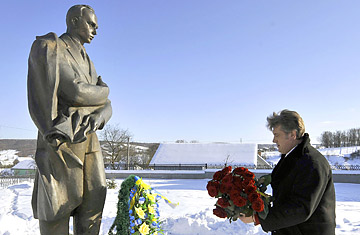
Ukraine's President Viktor Yushchenko lays flowers at the monument to Stepan Bandera.
Officially a lame duck after being eliminated in the first round of Ukraine's presidential election last month, the country's massively unpopular leader, Viktor Yushchenko, is going out with a parting shot that will stir up even more resentment among his critics. In one of his last acts as leader, Yushchenko has publicly honored a World War II-era nationalist leader believed by some historians to have collaborated with the Nazis and participated in the ethnic cleansing of Poles and Jews, naming him a "Hero of Ukraine." The decision, quite predictably, has angered an array of parties, from Jewish organizations to the governments of Poland and Russia to everyday Ukrainians fed up with the disappointments of his presidency.
The reaction to the commemoration of Stepan Bandera shows just how complex history in this part of the world is — and how sensitive people still are to what happened during the war. Born in 1909 in what is now western Ukraine but was then a part of Poland, Bandera became a regional leader of the Organization of Ukrainian Nationalists in the 1930s, a radical group modeled after other European fascist movements. The organization's aim was to throw off the shackles of foreign domination — Russia in the east and Poland in the west — and establish an independent Ukraine. So when Nazi Germany invaded Soviet-occupied Poland in 1941, Bandera cooperated as a means of achieving that goal, including allegedly killing Jews. "He was a small tyrant, a fanatic, but one with one clear goal in mind: an independent Ukraine," says David Marples, a historian and author of the book Heroes and Villains: Creating National History in Contemporary Ukraine.
But the Nazis didn't want Ukraine to be independent, either, and Bandera was arrested and sent to the Sachsenhausen concentration camp. His followers carried out partisan attacks against the Germans, but also slaughtered thousands of Polish civilians in their drive to rid the country of foreign elements. When the Soviets swept through the country in the fall of 1944, Bandera's followers began to fight the new occupier — a guerilla war that continued into the early 1950s. Bandera was killed by a Soviet agent in Munich in 1959. Following his death, he came to be viewed as a martyr and his name became a symbol of the Ukrainian independence movement. In awarding the title of "Hero of Ukraine" to Bandera on Jan. 22, Yushchenko cited his "indomitable spirit in standing up for the national idea and demonstration of heroism and self-sacrifice for an independent Ukrainian state."
Yushchenko, who was enormously popular after he swept to power in the Orange Revolution of 2004, made strengthening Ukrainian identity a central part of his presidency. He promoted the use of the Ukrainian language and sought to distance Ukraine from its former rulers in Moscow. He also encouraged a nationalist-oriented revision of Ukraine's history, recognizing heroes who fought for independence and seeking international recognition of the 1932-33 Holodomor famine, during which millions of Ukrainians starved to death as a result of Joseph Stalin's economic policies.
But Ukraine is split on Bandera's legacy to this day: many in the more nationalistic west supported Yushchenko's move to honor him, while those in the Russian-speaking south and east of the country were furious, as they still hold to the Soviet-era view of him as a traitor. One legislator in Crimea, which has a sizable Russian population, even burned his Ukrainian passport in protest. Critics say Yushchenko moved too fast in honoring such a divisive figure and should have left it to historians to further examine Bandera's past first. "We are all badly informed about Ukraine's history in the 20th century because we studied in Soviet schools," says Stanislav Kulchytskiy, a respected Ukrainian historian. "The ground needed to be prepared. ... The fact that it splits society wasn't taken into account."
The Bandera award made waves outside Ukraine's borders, too. The Russian government called the decision to commemorate him "odious" and Polish President Lech Kaczynski said it went "against the process of historical dialogue and reconciliation." The Simon Wiesenthal Center, a Jewish human rights organization, wrote to the Ukrainian ambassador in the U.S. to express its "deepest revulsion."
There's one thing most Ukrainians agree on — Yushchenko should have spent less time and energy on history, and more on the massive problems of the present. Yushchenko managed only a fifth-place finish in the first round of the presidential election last month, garnering 5% of the vote, in part because he never delivered on promised economic reforms or successfully clamped down on corruption during his five years in office. "The state's falling apart as he's deciding who's going to be the next Hero of Ukraine," Marples says. Or, as the influential newspaper Dzerkalo Tyzhnia put it, Yushchenko has had the opposite effect of King Midas: "Everything he touched rotted."
